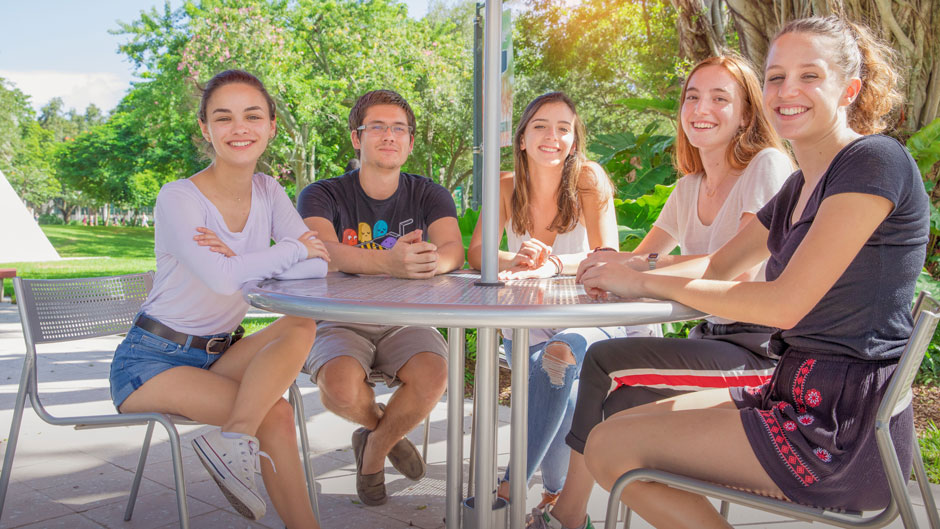Rising seas, the increasing intensity of Atlantic hurricanes and storm surge are threatening life and property along Florida’s coastlines.
Nicole Phocas, a University of Miami junior majoring in international studies and political science, is doing something about it. About a year ago, she signed the 100% Committed campaign that works to get campuses to commit to being powered by 100 percent renewable electricity by 2030. A short time later, she was tapped to start a UM chapter of The Climate Realty Project, a globally recognized, climate awareness organization started by former U.S. Vice President Al Gore in 2006.
As president of the local chapter, Phocas and her executive board are working to build awareness, further advocacy, and direct action against climate change to students on campus.
“Since, I was in the fifth grade I’ve been interested in making a difference,” Phocas said. “My friends and I pitched an idea to teachers and students to implement a recycling program at our school. They are currently still using the program.”
Since launching the chapter in January, Phocas and her team have signed up more than 100 members. The group believes that young people play an important role in the momentous undertaking that will change the overall economy and make a sustainable future for not only their generation, but future generations as well.
“Climate change is the defining challenge of our time and is in our faces that we have to take action now,” Phocas said. “I don’t think that the initiative will die down because a lot of the public now sees the urgency. Initiatives like this have the people behind it to combat the climate change deniers.”
The newest prediction made by the National Oceanic and Atmospheric Administration reports that by 2070, Miami streets will flood every day. That is, unless groups like The Climate Reality Project fight back. Corey Fehlberg, treasurer of the chapter, is calling on everyone to make a change.
“Businesses focus on recycling and the typical environmental things, but we are more focused on policy, the fundamentals in the decision-making process rather than just telling them that what they are doing to the planet is wrong but giving them an action plan,” Fehlberg said.
The group plans to invite politicians and community activists to their general meetings to speak on their action plans and how UM students can get involved outside of campus.
Since its inception, The Climate Reality Project has trained over 7,800 people to get involved. In August, the executive board of the UM chapter attended the Leadership Corps training to hear firsthand how they can help others lead the global fight for climate resolutions.
“It was awesome to hear Al Gore himself inform us about the climate crisis,” Phocas said. “We learned more about the ‘Inconvenient Truth’ so that we can go back into our communities to inform others about it. It made the issue more inspiring. Also, being around a bunch of other like-minded individuals was great too.”
Phocas and her team were most shocked to learn that certain communities are more affected by climate change than others. They learned climate change is disproportionately affecting the poor and minorities in the United States – a “climate gap” that will grow in coming decades unless policymakers intervene, according to Rachel Morello-Frosch, lead author of The Climate Gap.
UM is deeply committed to reducing its impact on the environment, according to the Office of Sustainability’s website. Teddy Lhoutellier, UM’s sustainability manager, implemented a plan to monitor and improve UM’s sustainability performance. Many of the goals are either in the process of being implemented or already underway. Most recently, Lhoutellier has met with Phocas to discuss ideas. He is looking forward to the group’s future plans for the UM campus.
“The chapter we have is a very important piece of UM – a group that has an important mission,” Lhoutellier said. “They [The Climate Reality Project] are advocating for more knowledge, more literacy and more action. They can make the connection between UM and the community. Their main mission is to advocate for more climate policy.”
Lhoutellier joined UM in 2014. Since arriving, he has witnessed many new programs – most founded by students – being implemented into campus life.
“One of the rewards is working with the students,” he said.

